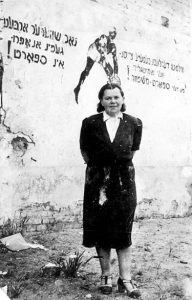Zvia Wildstein
Zvia Wildshtein was a born teacher; she nourished, rocked, tended and supported, helped, taught and educated children and youths at every stage of her life. These stages included Vilna, the gulag in Colyma, Siberia and the David Shimoni school in Givatayim (Israel). Her life story is that of a woman who dedicated her life to children, participated in their rehabilitation and comforted them; along the way she also managed to rehabilitate herself. Even though she was an educator and a social activist in Israel, whose story is documented in a book, it seems as though she is not sufficiently known to the wider public.
Zvia Wildshtein (née Jebuzni) was born in 1906 in Sarna in the region of Volhynia to a traditional Zionist family; she had a brother and a sister. Her grandparents made aliyah to Israel in 1913. When she was 12 she started giving private lessons to help the family. She went to the Hebrew high school in Sarna and, after she graduated she continued her studies in Vilna, giving private lessons all the time. Zvia studied history, pedagogy and psychology at the University of Vilna; she married Asher Wildshtein and three years later war broke out.
Source: Yad Vashem
Zvia Wildshtein's testimony about running the orphanage in the Ghetto of Vilna from 1941-1943
We had been in the ghetto for about a month when I met the first children whose parents had been exterminated at Ponary. They were hungry and miserable and their clothing were tattered. They had escaped from the death pit or from Ponary; Lithuanian policemen and the like found them and brought them back to the ghetto. It was part of my DNA that I had to help out. I was secretary of the Epidemiology Department but I asked to be released from that job and to be allowed to treat the children who had returned from Ponary and were reliving their parents' death without any assistance. Not everyone can treat a strange child. We founded an orphanage for girls in the synagogue and one for the boys. When a person knew what and how to demand from the children, the children received the maximum. There were hardly any teachers. They had been the first to go. The intelligentsia went first. I sat down with a few of my friends and asked them to help me organize the schooling because I was running around trying to make the synagogue homey. We got a few teachers together with whom I had worked before….
We finally got a house after we had been thrown out of four others. We would meet in the stairwell and I would bring them some food. Where did I get food from? A woman who had worked for my in-laws for many years lived in the city after the ghetto was built. She would buy food and bring it to me…I got a room where I had lived as a student; when I returned from the village in Russia after the Germans left and the Russians came, I found it empty. We organized the orphanage and the children lived there and learnt Hebrew there; we had cultural evenings and Peretz Markish and other writers came. Much was written in the newspapers about the Yiddish school that was founded in Vilna and the children came. There were about one hundred children there and later, more came….


